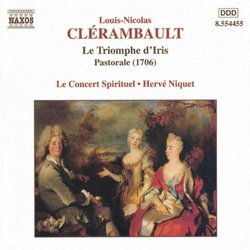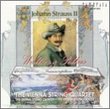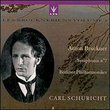| All Artists: Louis-Nicolas Clerambault, Hervé Niquet, Le Concert Spirituel, Gaëlle Mechaly, Jean-François Novelli, Serge Goubioud, Jacques Bona, Marie-Louise Duthoit, Claire Geoffroy-Dechaume, Jean-Francois Lombard Title: Clérambault - Le Triomphe d'Iris / Méchaly · Goubioud · Novelli · Bona · Le Concert Spirituel · Niquet Members Wishing: 0 Total Copies: 0 Label: Naxos Release Date: 2/22/2000 Genre: Classical Styles: Opera & Classical Vocal, Chamber Music, Forms & Genres, Theatrical, Incidental & Program Music, Historical Periods, Baroque (c.1600-1750), Classical (c.1770-1830) Number of Discs: 1 SwapaCD Credits: 1 UPC: 636943445525 |
Search - Louis-Nicolas Clerambault, Hervé Niquet, Le Concert Spirituel :: Clérambault - Le Triomphe d'Iris / Méchaly · Goubioud · Novelli · Bona · Le Concert Spirituel · Niquet
CD DetailsSimilar CDs
|
CD ReviewsTHE MOST WONDERFUL SENSE OF FRENCH BAROQUE NECLA ELIAÇIK | ISTANBUL, KOZYATAGI Turkey | 03/21/2002 (5 out of 5 stars) "This is Clérambault's and the french baroque music's most wonderful and unbeliveable cd. When you don't belive me,you should listen with your real player, track 3 and track 19. It's enough for you to decide to buy this cd. Very higly recommended !" Pastoral Playfulness Giordano Bruno | Wherever I am, I am. | 03/06/2009 (4 out of 5 stars) "If I were to try to rank the composers of the 18th Century according to their genius, Louis-Nicolas Clerambault (1676-1749) would not be seeded above 25th. Considering the competition in that greatest of all musical centuries -- Bach, Scarlatti, Zelenka, Telemann, Haydn, Handel, Hasse, Mozart, to name a few -- 25th would be pretty durn good. What Clerambault did best was to compose with 'brio' - liveliness - and this large-scale pastoral ballet/opera, the tale of two couples, shepherdesses and swains, is 'brio' from start to finish. Almost certainly it was written as a 'petit opera' for the court of Louis XIV, and it would have been performed with scenery and almost constant dancing. It's best appreciated on those terms, understood as an elegant diversion for the King's leisure.
Le Concert Spirituel, directed by Herve Niquet, has recorded a fine series of "grands motets" by Lully and other major composers of sacred music from the French court. It's amusing to hear the same ensemble perform something as light-hearted and animated as The Triumph of Iris. The vocal production of singers of this repertoire is highly idiomatic, uncompromisingly "French," as it has to be, with the emphasis on clarity of enunciation and expressive phrasing rather than 'bel canto' timbre or virtuosic display. On the whole, this is not a performance I will listen to frequently, since my personal taste is for more 'intellectual' fare, but I can recommend it enthusiastically to listeners who enjoy 'a cheerful noise' as they get on with life." |


 Track Listings (29) - Disc #1
Track Listings (29) - Disc #1

